Grab your cossie, we’re going for a dip
Listen to more playlists:
Featured
Blog
Taking Time to Live Well

Grab your cossie, we’re going for a dip

Illustration: ALICE PATTULLO
With its protruding spines, downward gaze and prehensile tail, this most beguiling fish looks like a shy, prehistoric ghost. Floating upright, it hangs motionless waiting for its prey to pass, which it then sucks up through its long snout. Found in seagrass habitats from Scotland to Dorset.
Most often seen when masses, known as a ‘bloom’, are washed up on the beach. Which is a shame, as they look most beautiful floating in transparent clusters. Moon jellyfish can grow up to 40cm in diameter and have short hairy tentacles that hang from their dome like a fringe. They are mostly harmless, though may sting sensitive skin.
This elegant starfish has long slender arms which they can cleverly self-amputate if being attacked; the arms regrow. Brittle stars prefer to live in great gangs (called ‘aggregations’) on the sea bed, their arms raised to catch plankton; can number up to 1,500 per square metre. Usually in deep water but sometimes under boulders and in rockpools.
Unlike other anemones, Snakelocks anemone’s bright-green tentacles remain out all the time: all the better to sting and capture small fish. They can be found on the seabed, attached to large seaweeds, and in sunny rockpools, where their flowing tentacles with their purple tips sift through the passing currents.
Attached to rocks and other objects by a long black penduncle and with a chalky white shell which opens to reveal spiky fronds, this unusual creature has an alien-like quality.
Often disguised by seaweed and sponges that grow all over it, this large knobbly crustacean has long-jointed legs, small claws and spiky shell. It can be found in South and West England and its sustainable numbers mean it’s increasingly eaten in the UK, although most are exported to France and Spain.

How it works:
1 Choose a book to pass on.
2 Find a place you’d like to leave it.
3 Stick one of our book plates in the first page.
4 Write in your name, date and where you’re leaving it.
5 Leave it for someone else to enjoy.
6 Share socially: say where you left it and tag @simplethingsmag on Instagram.
You’ll be able to print them at home, A4 size, to cut and paste into your books.
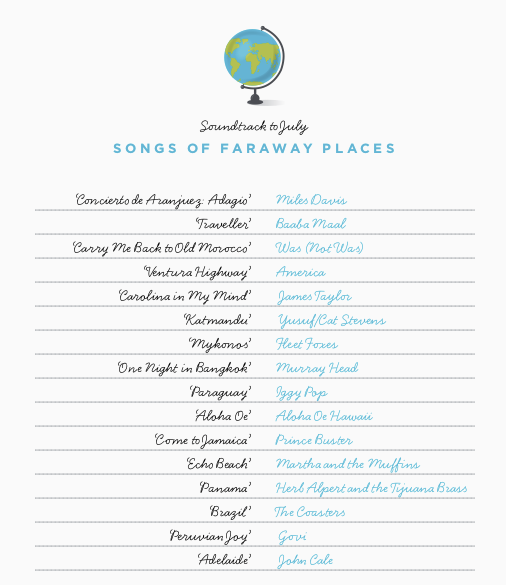
Yearning for some foreign travel? Let the music transport you
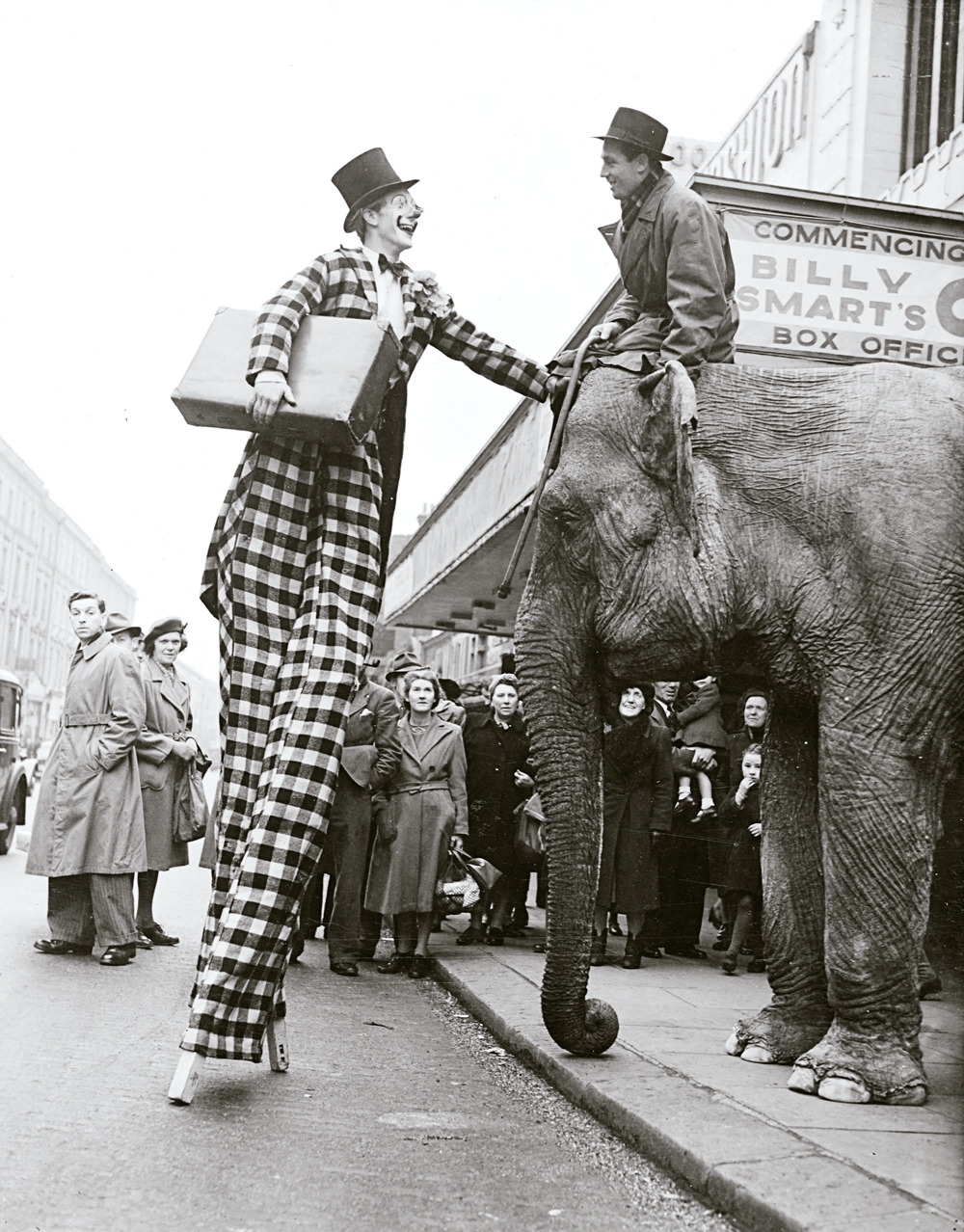
Joseph Grimaldi 1778–1837
Not strictly a circus clown (he performed mainly in panto), but deserving of a mention as he was the first to sport ‘whiteface’ and a red smile, and is known as ‘the father of modern clowning’.
Grock 1880–1959
A Swiss acrobat, Charles Wettach started as a clown in 1903. He left the circus to perform in music halls instead, subverting the form, as someone who ran away from the circus rather than to it.
Emmett Kelly 1898–1979
American, Kelly, clowned as ‘Weary Willie’, a character based on the ‘hobos’ of the depression era. His son, Emmett Kelly Junior later continued the act.
Charlie Cairoli 1910–1980
French clown of Italian descent, Charlie began clowning at the age of seven as ‘Carletto’ and later worked at Blackpool Tower’s circus for 40 years.
Lou Jacobs 1903–1992
The first ‘Auguste’ clown (the ‘red’ clown types with big shoes, lairy trousers and orange wigs), Lou Jacobs is credited with popularising the ‘clown car’ and also being the first to sport a red rubber ball as a nose.

Illustration: Kavel Rafferty
Get prepped
Increase sleep leading up to the big night. On the day, have a nap in the afternoon.
On the night
Drink lots of water
Use caffeine carefully – in smaller, regular doses rather than huge cups.
Practise deep breathing (see The Simple Things January 2018 for a guide).
Eye drops are your friend versus tiring, dry eyes. Resting with eyes closed for 10 minutes also helps.
Keep moving - Extra points for mingling or dancing.
Step into the light - Bright light fools the body that it’s not yet bedtime.
Snack on foods that provide long-lasting energy, such as peanut butter, Greek yogurt or apples.
Next day
Don’t drive or operate machinery when drowsy.
Have lots of water and fresh fruit and vegetables... and an early night!

Illustrations: FLORA WAYCOTT
21 May – 21 June
“Can you remember who you were, before the world told you who you should be?” asks Canadian author Danielle LaPorte.
We all need to recharge sometimes and the Sun’s journey through your sign in June is your chance to replenish your spirit by honouring your needs and engaging in pastimes that plug you into the universal battery. August builds on this theme of time out as Mercury goes retrograde, so whether you schedule a regular massage, daily meditation or creative hobby, know that this isn’t so much a time for pushing out into the world, but a time to reflect and heal, physically and emotionally.
Turn to page 126 of the June issue for the other twelve star signs.

The Titanic in dry dock c 1911. From Ocean Liners at the V&A until 17 June (Getty Images)
The sinking of the Titanic in 1912 is one of the world’s most famous tragedies, with the loss of around 1,500 lives. “As the first major international disaster in peacetime, it generated a huge interest,” says Eric Kentley, co-curator of ‘Titanic Stories’ at National Maritime Museum, Cornwall. “Not just in America, Britain and Ireland, but also in Scandinavia and the Baltic countries. No area seemed to be untouched.” But it continues to fascinate.
As Kentley points out, “Few people have heard about the Doña Paz or the Wilhelm Gustloff, which are far worse tragedies.” The reason, he thinks, is “partly because it is so rich in stories.” He explains: “In the two hours 40 minutes it took for the ship to sink, you can see every type of human behaviour – self-sacrifice, self-preservation, bravery, cowardice, duty, incompetence... It’s very easy to imagine ourselves on the deck of that ship and wonder how we would behave.”
Some positives did emerge from the disaster, however, such as a re-examination of safety measures at sea. And, for the QE2, a perhaps surprising surge in bookings following the release of the James Cameron film.
‘Ocean Liners: Speed and Style’, sponsored by Viking Cruises, is at the V&A until 17 June, and opens at the Dundee V&A on 15 September. ‘Titanic Stories' is at National Maritime Museum, Cornwall until 7 January 2019.
Turn to page 86 of May's The Simple Things for more on our look back at ocean liners.

“Dancing helps relieve the pain
Soothes your mind, makes you happy again”

Treating resilience not as an innate quality, but as a skill to be practised and nurtured, allows you to make lemonade whenever life throws you lemons
The Finnish word sisu refers to a mix of courage, resilience, grit and ‘guts’. In her new book Sisu: The Finnish Art of Courage (Gaia), Joanna Nylund explains how the Finns’ close connection with the weather and nature has played a crucial role in forging the resilient nature of the people. “Living in Finland means living with sharp contrasts,” she says. “It is the extremes that rule our lives – from gritting our teeth and summoning our sisu at the approach of winter to celebrating the eagerly anticipated summer with a devotion to the sun that most closely resembles Celtic worship.”
After that long, hard winter, the Finns’ summer ritual is more about celebrating discomfort than luxury hotels or even glamping. In late June, the country collectively withdraws from everyday life and heads out into nature, spending a few weeks in a mökki (summer cabin). The cabin will have a fireplace and cooking facilities, but rarely central heating – and sometimes no electricity or running water.
“Squatting by the lake to wash your dishes in cold water is so romantic!” says Nylund, who explains how their ancestors grew resilient through hardship. “We are modern people living in a modern world, but at heart we are still rural, and we love our sometimes harsh environment. It has given us our sisu.”
Nature is grounding, it teaches self-sufficiency and spending time in it boosts self-esteem. You don’t have to spend four weeks in a cabin – start by spending a bit of time outdoors every day, read and learn a little about the nature around you, dabble in being more self-sufficient by growing a few veg or salad leaves in your garden, spend a night under canvas, and go from there.
Turn to page 92 of May's The Simple Things for more of our feature on How to bounce back.

On 10 June walk to mark 100 years of votes for women. With handmade banners and wearing the suffragette colours of green, white and violet, marchers will form a river of colour through London, Cardiff, Belfast and Edinburgh. Details at processions.co.uk
PROCESSIONS is a once-in-a-lifetime opportunity to take part in a mass participation artwork to celebrate one hundred years of votes for women. In 1918, the Representation of the People Act gave the first British women the right to vote and stand for public office. One hundred years on, we are inviting women* and girls across the UK to come and mark this historic moment as part of a living portrait of women in the 21st century.
On Sunday 10th of June, women and girls in Belfast, Cardiff, Edinburgh and London will walk together as part of this celebratory mass participation artwork. Wearing either green, white or violet, the colours of the suffrage movement, the PROCESSIONS will appear as a flowing river of colour through the city streets.
One hundred women artists are being commissioned to work with organisations and communities across the UK to create one hundred centenary banners for PROCESSIONS as part of an extensive public programme of creative workshops.
Sign up: processions.co.uk
DON'T MISS: Next month, we look at why women march, plus how to make your own banner or pennant. All in the June issue (on sale 30 May).

There's much more to boredom than watching paint dry, says aficionado of the dull, James Ward
Boringness is easy to embrace. Slow down. Read Species of Spaces by George Perec. Go for a walk without a destination. Write things down. Don’t start with an end goal in mind, just see where things take you. Once you’ve landed on something, go and read the Wikipedia page about it. Then look at what else the people who edited that page also edited and read those, and so on. Before you know it, it’s three weeks later and you’re obsessed with something you didn’t even know existed at the start of the month.
When you’re on train or a bus, everyone is in a cocoon staring at their phone. I’m loath to be judgmental about people’s relationship with technology. Someone could be playing Sudoku, the person next to them could be reading the New York Times, or a new novel. Someone might be listening to a podcast about wooden palettes or emailing their best friend on the other side of the world. What we do need sometimes is time out from the constant updates and notifications. This is what stops you exploring. Having a day off from that is good.
I always say about Boring, that “nothing of any importance will be discussed”. The conference is a day away from people’s hot takes, where things are just a little bit smaller.
Turn to page 92 of April's The Simple Things for more from James Ward and his Boring Conference.

Choo, choo! Get your ticket and climb on board

My kayak by Sara Pearse
My kayak is a bright, cerulean blue, and sturdy, with smooth, solid curves. When I see photos of me in it, I look different, somehow – alone, strong, adventurous. This person, paddle slicing through glassy water, is free. She can take off on a whim, cope with whatever is thrown at her, and is always on the cusp of discovering something new – a hidden cove, a shoal of darting mackerel, a secret house only glimpsed from the sea. This person knows exactly where she is going, isn’t lost in the day to day.
My husband bought it for me after a hospital stay. Me, clock-watching as his 30-minute operation became four hours, words muttered about haemorrhaging, cauterising, complications. When he finally emerged, he still wasn’t well. I remember the nurse’s flushed face, the young doctor’s shaking hand as it dawned things weren’t quite going to plan. I’d never faced death like that, right in the eye. What scared me was how lonely it was – my husband was the one I turned to in a crisis, but this time the crisis was him. My stomach dipped as I thought about our two young daughters. What would I tell them?
But he made it through, and after, there was a freedom about him – something loose,
untethered. We did the things we’d only talked about before, dreams we’d squirrelled away inside our heads – took the risky job, adopted the kitten my daughter wanted (not just one but two), bought the kayak I’d been coveting.
There’s something primal about paddling. It feels ancient, the rhythm of it. I’m part of the water, literally feeling it, its movements, as it resists the paddle stroke by stroke. So low on the water, without the grumble or whine of a motor – the birds mistake me for one of them. They arc through the sky, or sit perched on a nearby rock, feathers slick with water. Cormorants dive headfirst into the waves right in front of me, reappear a minute later, black heads gleaming.
I chart the changing seasons from the water, and I’ve learnt that the sea has its own topography. I now know where the rocks are, crusty with barnacles, just jutting out of the water, and where the beds of sea grass hide, the swathes of seaweed – gelatinous green ropes and brown fern-like growths that loop around the paddle.
I can’t wait to show my daughters this world, but I’ll still kayak alone – remembering why we bought it, to become the person I am inside my head.
We’d like to know what you treasure - whether it’s a sentimental artefact, a person, a place or something else. Tell us in 500 words what means a lot to you - email thesimplethings@icebergpress.co.uk
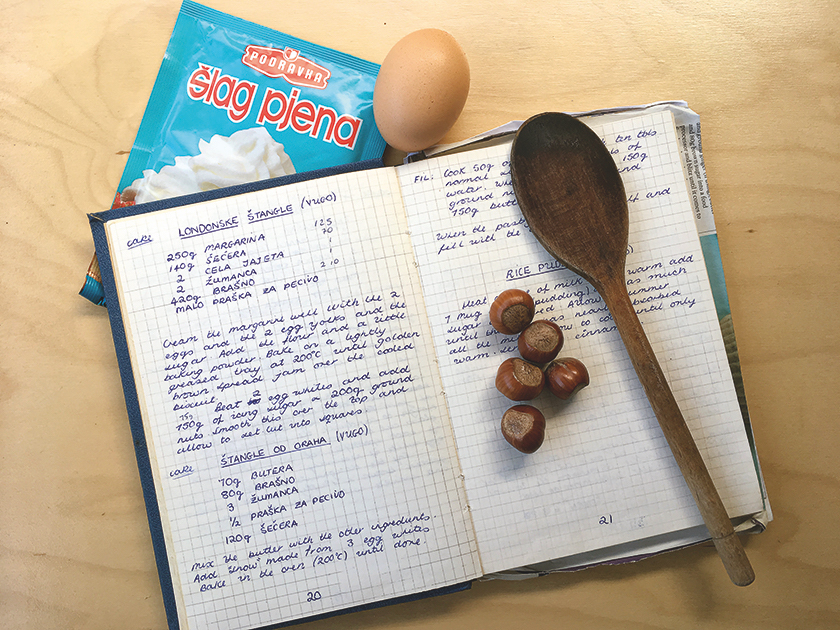
My hand-written recipe book by Jacqui Hitt
Among my collection of recipe books is a special one with a plain, blue cover. It’s filled as much with unforgettable moments as it is with edible delights. Whenever I flick through its pages, I find myself back in 1986. I’m 17 and living with a family in Belgrade in what is now Serbia. At that time, it was the capital of the ‘non-aligned socialist republic’ of Yugoslavia: neither Western nor fully behind the ‘Iron Curtain’.
My strongest memory is of sitting at the table in the hallway that doubled as a dining room in my host family’s flat, noting down recipes in my notebook. Most were ones my host mother, Marija, taught me to cook. We had little shared language and cookery was an activity we could do together without words. Weighing, chopping, stirring, and rolling could all be done by watching or gesturing to each other.
I wrote down some of the recipes in English, others in Serbo-Croatian, occasionally a mix of the two. Many only detail rough quantities: three cups of flour, two cups of sugar, one of oil and large amounts of eggs (10 or 12 is not unusual). There are smudges and stains showing where ingredients strayed onto the page.
Marija’s cooking was different from what I knew from home, restricted by shortages imposed by a communist state. Food was strictly seasonal and local. Special dishes stood out because they were a rare treat.
On birthdays and important holidays, Marija would spend hours making cakes or savoury bakes from scratch. Filo-pastry filled with spicy ground meat or salty cheese; a strawberry cake with whipped cream that will forever be the best I’ve tasted; and plum dumplings so juicy that they burst in my mouth at first bite.
I still make these dishes, and just looking at the list of ingredients sends me back to a specific moment in time. The little chocolate, cream-filled išleri biscuits Marija made for my 18th birthday. The cinnamon-scented apple cake she baked to celebrate her son’s return from military service. The simple delight of a pile of pancakes filled with rosehip jam on a cold winter’s night.
I treasure my recipe book for many reasons – for the memories it contains and the fact that, woven into every page, are recipes for a good life as well as fabulous food.
We’d like to know what you treasure - whether it’s a sentimental artefact, a person, a place or something else. Tell us in 500 words what means a lot to you - email thesimplethings@icebergpress.co.uk

Getty Images
The t-shirt evolved from 19th-century underwear. Light, well fitted and easily washed, it became popular as a bottom layer of clothing for workers and those in the armed forces, and made its first written appearance in 1920, in F Scott Fitzgerald’s debut novel, This Side of Paradise. The first printed t-shirt ever worn publicly is believed to be an Air Corps Gunnery School t-shirt, which appeared on the cover of LIFE magazine in 1942. While in 1938, an American marketing campaign argued that “you don’t need to be a soldier to have your own personal t-shirt”, the style really took off thanks to film appearances on Marlon Brando in A Streetcar Named Desire (1951) and James Dean in 1955’s Rebel Without a Cause. They’ve been worn by everyone, from heartthrobs to more normal types since.
Turn to page 80 of the March issue for more on the T-shirt and how much it says about who we are, what we believe and where we belong.
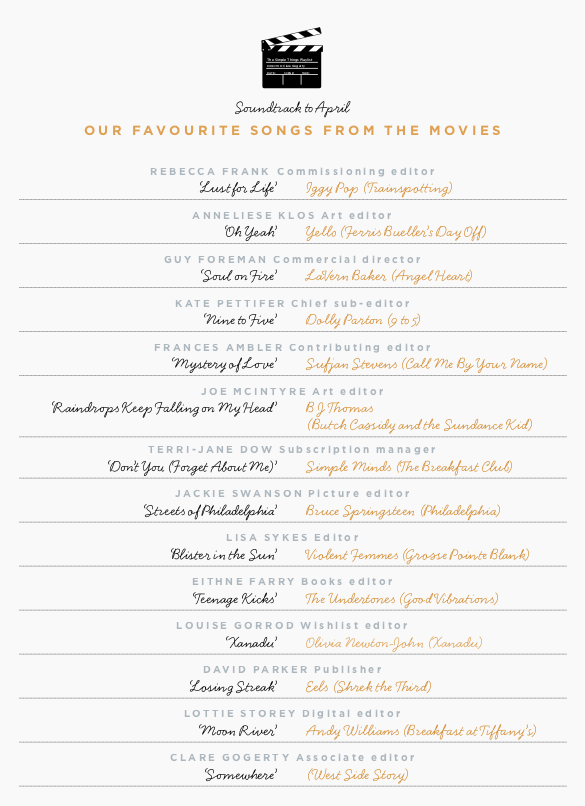
Our favourite songs from the movies.

The theme for our March issue of The Simple Things is HAPPY. Free with every issue - one of four Happiness patches (find out how to get yours). Meanwhile, here are a few everyday actions that can enrich your life
Be active
Climb a hill. Or go for a walk or run. Simply stepping outside will have a positive impact. Cycle. Play a game. Garden. Dance. Exercising makes you feel good, so discover which physical activity you most enjoy and that works for your level of fitness.
Connect
Gather friends. Spend time and share good food with those around you. Think of home, work and your local community as the cornerstones of your life and invest time in developing relationships there. These connections will support and enrich you every day.
Keep learning
Make a campfire. Try something new. Rediscover an old interest. Sign up for that course. Take on a different responsibility at work. Fix a bike. Learn to play an instrument or how to cook your favourite food. Set a challenge you will enjoy achieving. Learning new things is a confidence booster – and is fun.
Take notice
Watch clouds. Be curious. Catch sight of the beautiful. Remark on the unusual. Notice the changing seasons. Savour the moment, whether you are walking to work, eating lunch or talking to friends. Be aware of the world around you and what you are feeling. Reflecting on your experiences will help you appreciate what matters to you.
What makes you happy? Come over and tell us on Facebook or Twitter.
Plus - enter our competition! Design our fifth patch and you could win a VIP experience to The Good Life Festival 2018.

Books to make you literally (and literarily) LOL. As loved by The Simple Things team
How Hard Can It Be? by Allison Pearson
An about-to-be-50 mother juggles her return to work with teenagers, ageing parents and hormonal hell.
Nomad by Alan Partridge
Steve Coogan’s creation travels in the footsteps of his father to Dungeness power station while trying to secure a TV series.
Love, Nina by Nina Stibbes
The (real) letters written by a nanny to her sister as she’s plunged into the midst of the London literati in the 1980s. Even more hilarious for being true.
Me Talk Pretty One Day by David Sedaris
A series of essays following Sedaris’ attempt to learn French after moving from New York to Paris.
What would you add? Come over and tell us on Facebook or Twitter.
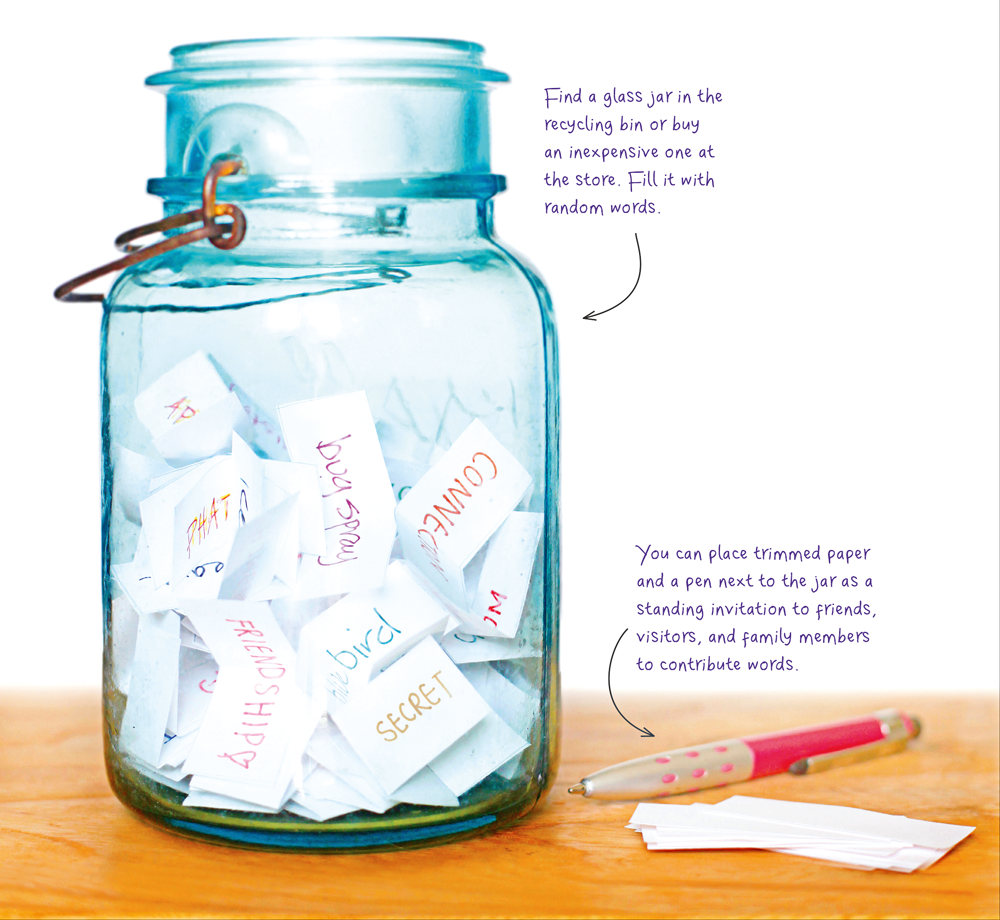
This is one of the simplest yet most fruitful and rewarding journal prompts, because it’s uncomplicated and never fails to inspire, sitting on your shelf or desk, always available for spontaneous creativity.
Find a glass jar in the recycling bin or buy an inexpensive one. Fill it with random words. Leave trimmed paper and a pen next to it as a standing invitation to friends, family and visitors to contribute words.
Choose a word or a few words from the jar and write them on a journal page. Draw a sketch based on the word(s) or incorporate them into a small piece of writing – a poem, a blurb, the beginning of a story or a speech bubble. When you’re finished, add a new word to the jar.
Turn to page 77 of February's The Simple Things for another Journal Sparks idea: Picture your day in geological layers.
We celebrate slowing down, enjoying what you have, making the most of where you live, enjoying the company of of friends and family, and feeding them well. We like to grow some of our own vegetables, visit local markets, rummage for vintage finds, and decorate our home with the plunder. We love being outdoors and enjoy the satisfaction that comes with a job well done.